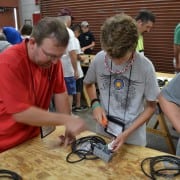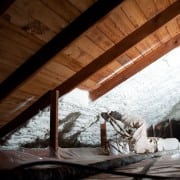Are you grounded? GFCI outlets can help!
Did you know there are different types of electrical outlets? Each are designed for different purposes; however, there is one specific type that stands high above the rest—the ground-fault circuit interrupter (GFCI) outlet. GFCIs have saved thousands of lives and cut the number of electrocutions in half since the 1970s. If your home lacks GFCI outlets, don’t fret—you can learn how to “get grounded.”
GFCIs are the most efficient outlet in protecting from electrical shock. If it senses a loss of current, the outlet switches off power to that circuit. These devices can either be installed in your electrical system or built into a power cord. The third hole at the bottom of the outlet is known as the “ground” slot, and it monitors electrical currents that flow through the left “neutral” slot and the right “hot” slot on each outlet. A GFCI can react faster than a blink of an eye to any imbalance of power by immediately shutting off the electrical current. These outlets are now a requirement in all places where water could potentially come into contact with electrical products such as bathrooms, garages, outdoors and kitchens. GFCIs are not exclusive to three-prong outlets. They can be installed into standard outlets, and there are even portable devices available when installation is not practical.
GFCIs should be tested at least once a month to ensure they are working effectively. The first step you need to take is to test an item, such as a lamp, that visibly powers on when plugged in. Push the “reset” button to prepare the outlet then push the “test” button. Did your lamp turn off? If it did, the GFCI is working properly. Now, hit the “reset” button once again to power it back on. If your lamp did not power off, then you should contact a certified electrician to correct the problem.
Next time you have a free moment, take the time to look around your house. If you’re not “grounded,” consider updating your electrical outlets to GFCIs.
Sources: Electrical Safety Foundation International, Consumer Product Safety Commission
Amber Bentley writes on energy efficiency issues for the National Rural Electric Cooperative Association, the Arlington, Va.-based service arm of the nation’s 900-plus consumer-owned, not-for-profit electric cooperatives.











Leave a Reply
Want to join the discussion?Feel free to contribute!